Wednesday 21st October was International Pronouns Day. Our National Broadcaster decided to celebrate by gaslighting children.
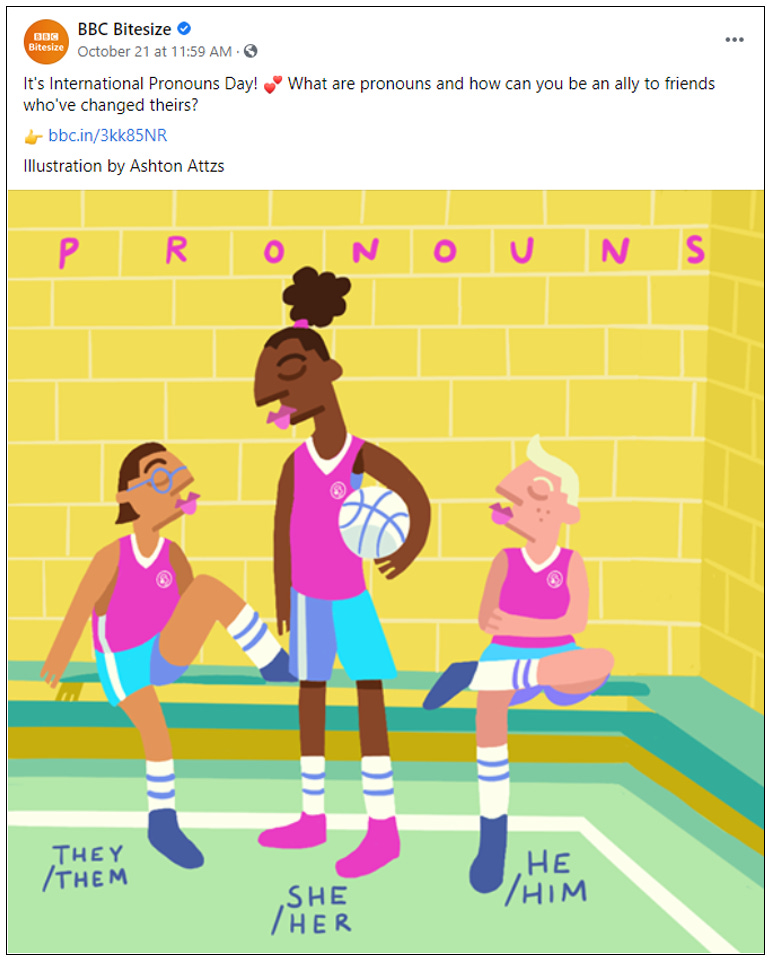
BBC Bitesize is an online educational resource aimed at children aged 6 - 16.
They also linked to an article on its website called “How to be an ally to friends who’ve changed their pronouns”.
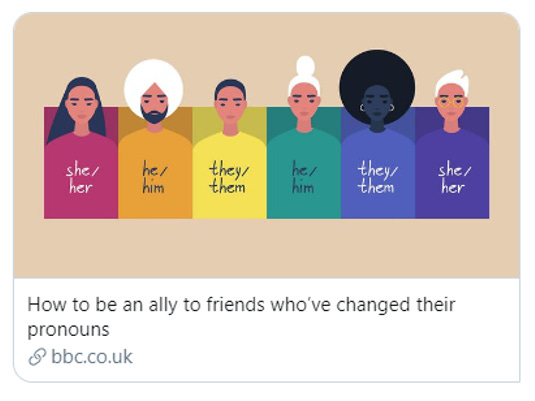
The article not only links to Stonewall’s website, but also contains instructions on how to centre special pronoun people from ubiquitous gendah grifter, Jamie Windust.

Jamie expects other people to pay for his Ubers, apparently.

But back to the BBC Bitesize pronoun nonsense. On Twitter, the post attracted a barrage of negative comments and so was deleted rather hastily.
It reappeared again the following day. This time with the replies turned off.

And now it has disappeared again.
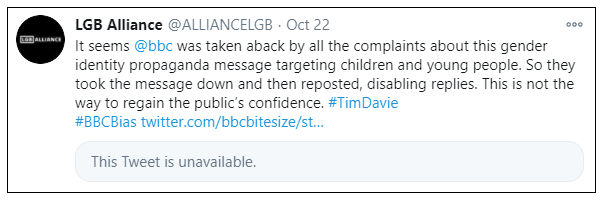
Perhaps it has been removed for a second time because of even greater pushback this time. Or maybe because of the negative press coverage it received.
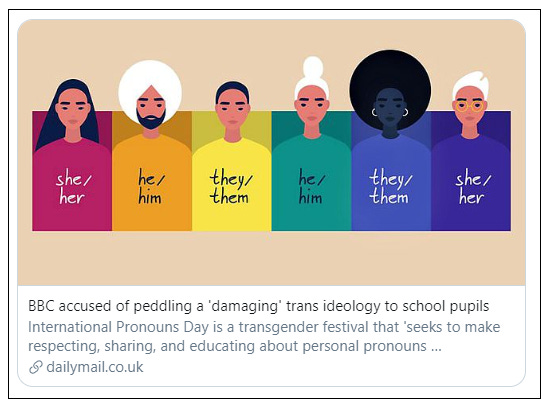
They also seemed to be arbitrarily blocking licence fee payers. Surely an official BBC Twitter account isn’t subscribing to a blocklist?
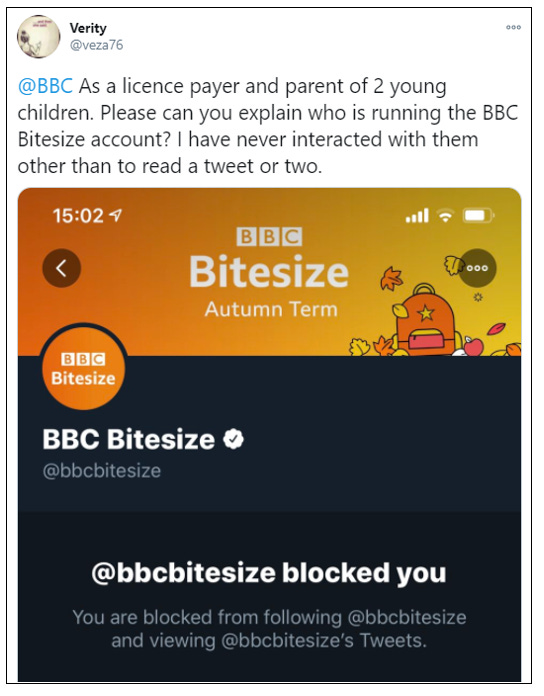
Their tweet has gone but the corresponding article is still on the BBC Bitesize website, telling kids as young as six that some people are neither male nor female.

On Tuesday 20th October, Woman’s Hour included an item about the politicisation of Mumsnet.

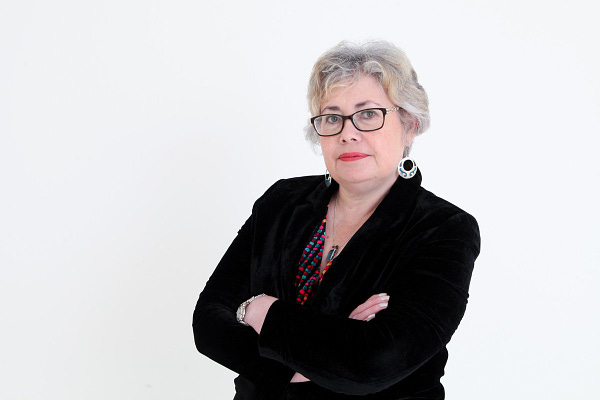
During the item, presenter, Jane Garvey, asked author, Sarah Pedersen, how the gender recognition act was discussed on Mumsnet.
Pederson explained that women concerned about the effect of GRA reform on female rights have found that Mumsnet is one of very few arenas in which they can safely air their views. She mentioned that some site users have become involved with feminist groups such as Filia, WPUK and Fair Play for Women.
Garvey interrupted her and stated, “I just need to be very clear that they are groups that some people have described in some circumstances as transphobic”.


The organisations concerned responded with the following joint statement:
“FiLiA, FPFW and WPUK are not transphobic. It is not acceptable for a BBC journalist to repeat libellous comment about us as if it is fair comment or a balancing of the discussion. There is simply no basis in fact for this comment to be made. It is the repetition of misogynist slander to which too many women are subjected.
These comments are seriously prejudicial to the reputations of women involved with these organisations, some of whom have previously been invited on the programme.”

Last month, broadcasting legend and former Woman’s Hour presenter, Dame Jenni Murray, spoke out about being censured by the BBC after challenging trans rhetoric in an article for The Times.
“I made clear that I was not transphobic or anti-trans… I merely asked the trans activists to acknowledge the difference between sex and gender.”
She was vilified on social media, branded a ‘terf’ and there were calls for her to be sacked. None of this surprised her. However, she was shocked by the BBC’s response.
“I was roundly ticked off publicly and informed that I would not be allowed to chair any discussions on the trans question or the proposed changes to the Gender Recognition Act.”
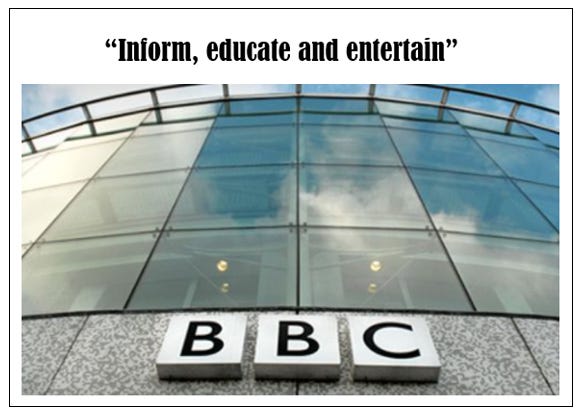
The BBC has been ramming this questionable ideology down licence-payers’ throats for a number of years.
Back in 2014, BBC Radio 4 aired the first of five series of Just a Girl, a “Powerful drama inspired by real-life experiences of people coping with a child born into the wrong body”.
In the programme, the central character is a male child who says he is a girl and so, we are led to believe, he really is a girl. Now called Amy, he likes pink, he must have puberty blockers, parents are cruel for preventing their daughters from attending a sleep-over with him and anyone who dares challenge this wisdom is a nasty old bigot.
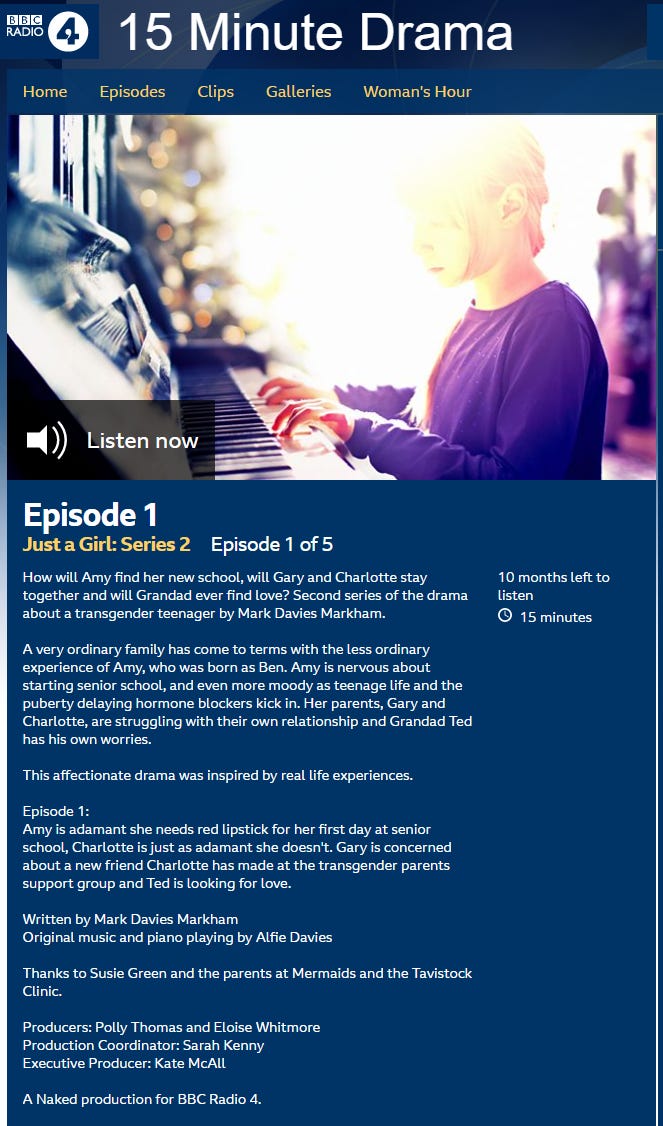
The programme listing on the BBC’s website contains this credit: “Thanks to Susie Green and the parents at Mermaids and the Tavistock clinic”.
Also in 2014, and several times since then, the BBC screened a programme called I Am Leo, a documentary about a 13-year-old female child who identifies as male, gets diagnosed at the Tavistock & Portman clinic and begins taking puberty blockers.
It affirms harmful stereotypes, promotes discredited theories about ‘brain sex’ and suggests that a person can choose their own sex.
The programme was made for CBBC; intended for and screened to children.
Tavistock Director, Polly Carmichael, appeared in the programme, promoting the use of hormone blockers as a harmless pause button with no side effects.
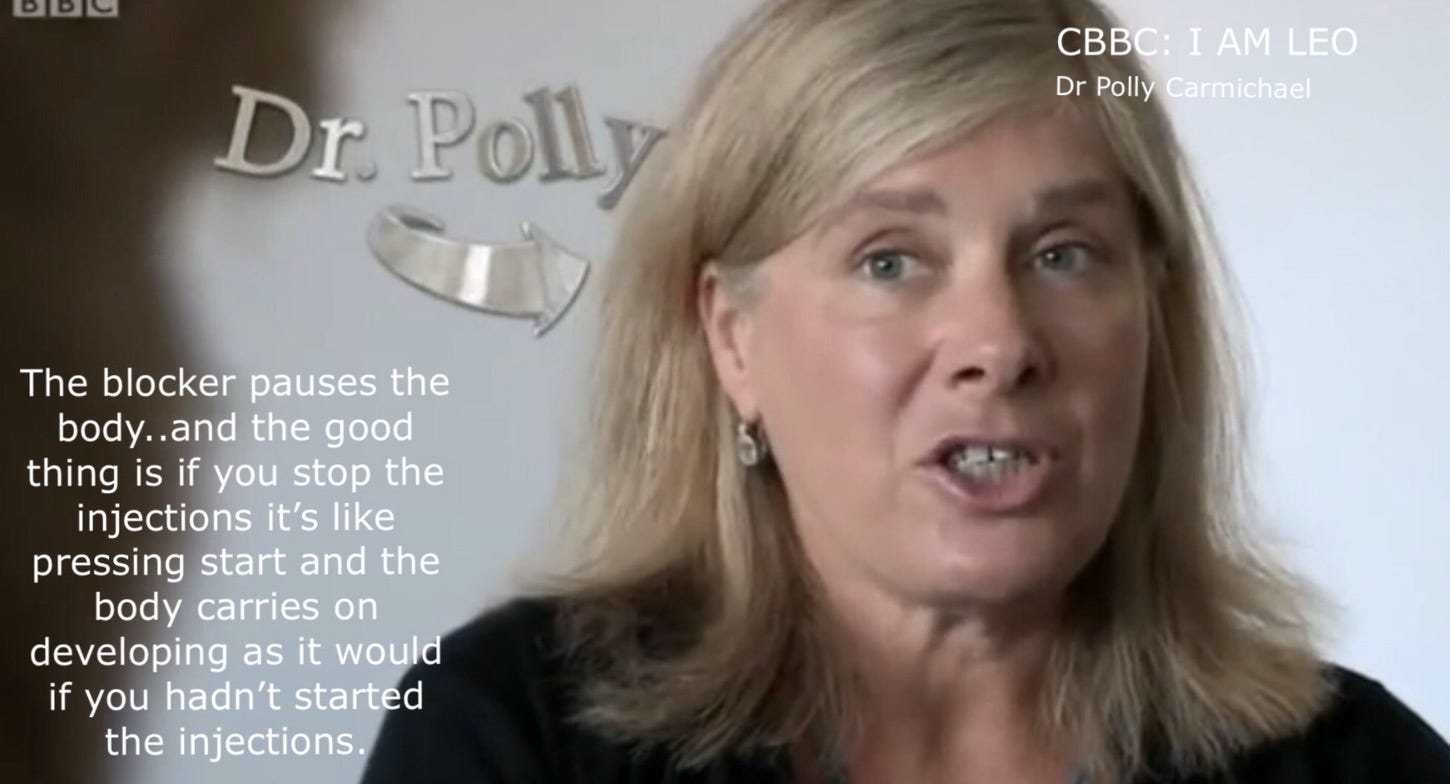
Last September, The Times ran a story about a BBC Teach film which 'educates' school children on gender identity.
BBC Teach is a branch of the BBC which provides classroom resources to UK schools. It produced a series of films aimed at school children aged 9-12.
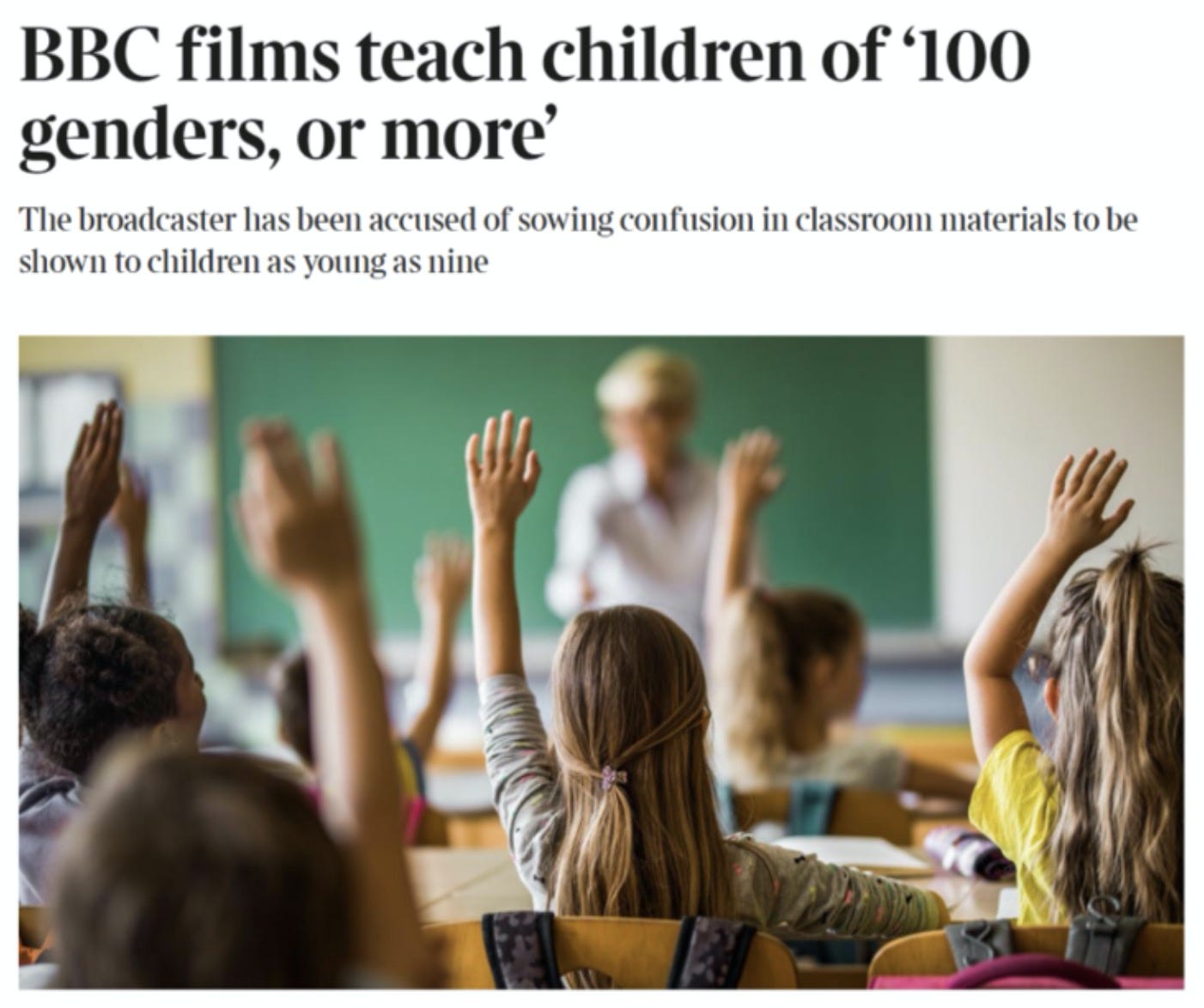
In one of the films a teacher explains gender identity. “We know that we have got male and female, but there are over 100, if not more, gender identities now."
Earlier this year CBBC screened an Australian drama, First Day, about a 12 year old boy who identifies as a girl called Hannah.
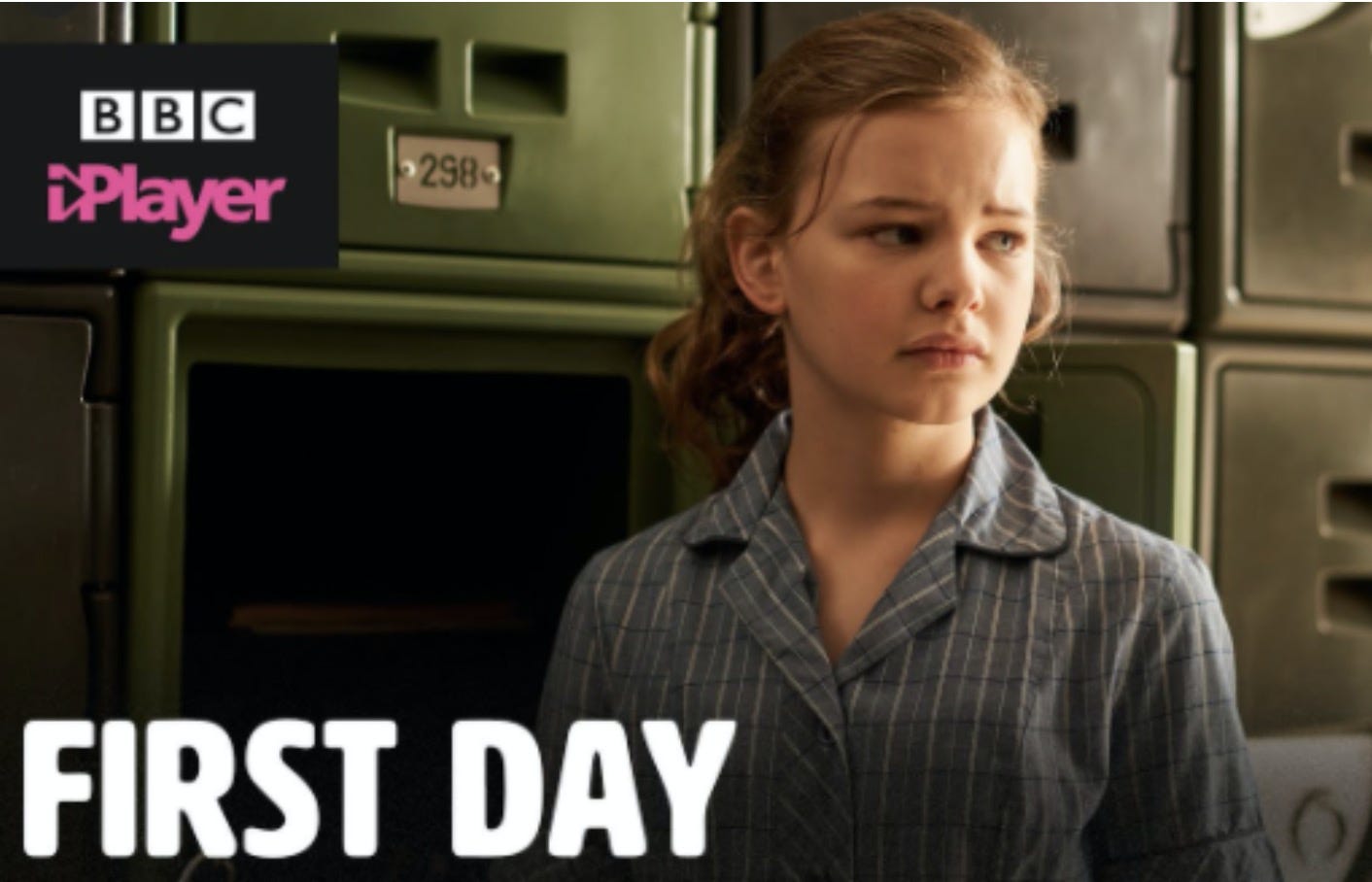
Safe Schools Alliance reviewed the programme for its website: “The series’ sole purpose is to manipulate young children into emotionally embracing a trans agenda. It does this by inducing such a feeling of pathos in the audience that any opposition to the narrative advanced is implicitly framed as hateful.”
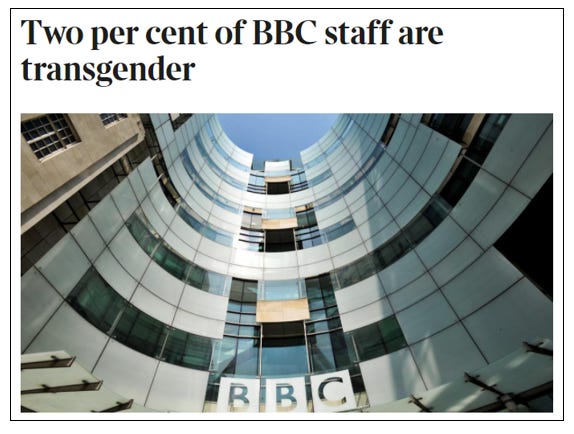
In 2018 The Times reported that, according to the corporation’s own head of diversity, 2% of BBC staff are transgender. That’s more than double the estimated percentage of trans people in the UK population generally. Quite a ratio.
Writing in Unherd, Julie Bindel points out that certain sections of the BBC are not treating the debate around gender identity ideology with the impartially the corporation is supposed to maintain.
“I have been informed by a number of BBC staffers that its LGBT forum, which is dominated by trans-identified members, has a huge amount of influence at the corporation.”
Our publicly-funded national broadcaster should not be pushing an anti-science ideology, lying to adults while grooming kids to believe there is something wrong with them, or something wrong with their requiring single-sex spaces. If anyone at the BBC would like to blow the whistle on the situation in there, please get in touch. We can guarantee anonymity.
If you would like to make a complaint to the BBC about its coverage of gender identity ideology, you can find all the necessary details here.





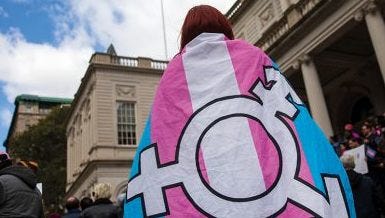
Thanks for this eye-opening article. It's worrying to think of the damage to children the supposedly 'impartial' BBC may be causing.
It is shocking BBC is blocking license payers !!!!! #GoWokeGoBroke for BBC
Lot of Gaslighting happening with pronouns and raping people into accepting gender Ideology. No wonder people are either being kicked out, forced to leave or resign due to increasing woke pressure.
Very depressing article, and yet very factual , thanks for collating it for us, as usual JL ❤️